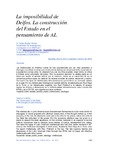| dc.contributor.author | Gaytán Alcalá, Felipe | |
| dc.creator | Gaytán Alcalá, Felipe; 36556 | |
| dc.date.accessioned | 2019-02-28T03:20:19Z | |
| dc.date.issued | 2012-12 | |
| dc.identifier | http://revistasinvestigacion.lasalle.mx/index.php/recein/article/view/94 | |
| dc.identifier.citation | Gaytán Alcalá, F. (2012). La imposibilidad de Delfos. La construcción del Estado en el pensamiento de AL. Revista del Centro de Investigación de la Universidad La Salle, 10(38), 233-244. | es_MX |
| dc.identifier.issn | 1665-8612 | |
| dc.identifier.other | https://doi.org/10.26457/recein.v10i38.94 | |
| dc.identifier.uri | http://revistasinvestigacion.lasalle.mx/index.php/recein/article/view/94/281 | |
| dc.description.abstract | Los intelectuales en América Latina se han caracterizado por ser más parecidos a ideólogos o profetas sociales que constructores abstractos del pensamiento encerrado en la academia o en las artes. Su obsesión fue y es la crítica al poder, mejor dicho, la crítica al Estado como articulador del poder. Pero la excesiva atención no estaba dada en un deseo por asaltar el aparato estatal, por el contrario, creían en su capacidad de ser la conciencia política capaz de catalizar los deseos sociales de justicia, desarrollo y nación. Dos fueron los tipos de intelectuales latinoamericanos que tuvieron su momento estelar en el siglo XX: los intelectuales ideólogos en sentido estricto, encabezados por Raúl Haya de la Torre, y; los intelectuales expertos, con Raúl Prebisch a la cabeza. El ensayo explica los deseos y obsesiones de la intelectualidad latinoamericana vista a través del APRA y de la CEPAL, aún vigente con otros nombres. | es_MX |
| dc.description.abstract | The intellectuals in Latin America have characterized themselves by to be more similar to ideologists or social prophets who abstract constructors of the thought locked up in the academy or the arts. Its obsession went and is the critic to the power, rather, the critic to the State like articulator of the power. But the excessive attention was not given in a desire to assault the state apparatus, on the contrary, believed in its capacity to be the political conscience able to catalyze social desires of justice, development and nation. Two were the types of Latin American intellectuals who had their stellar moment in 20th century: the intellectual ideologists in strict sense, headed by Raul Haya de la Torre, and; the expert intellectuals, with Raul Prebisch at the top. The test explains desires and obsessions of the Latin American Vista through the APRA and of Cepal, still effective intellectuality with other names. | es_MX |
| dc.format | application/pdf | es_MX |
| dc.language.iso | spa | es_MX |
| dc.publisher | Universidad La Salle México, Dirección de Posgrado e Investigación | es_MX |
| dc.relation | http://revistasinvestigacion.lasalle.mx/index.php/recein/article/view/94/55 | |
| dc.rights | Acceso abierto | es_MX |
| dc.rights.uri | http://creativecommons.org/licenses/by-nc-nd/4.0 | * |
| dc.source | Revista del Centro de Investigación de la Universidad La Salle; Vol 10 No 38 (2012): Revista del Centro de Investigacion. Universidad La Salle; 233-244 | en-US |
| dc.subject | Estado | es_MX |
| dc.subject | Política | es_MX |
| dc.subject | Poder | es_MX |
| dc.subject | Intelectuales | es_MX |
| dc.subject | Ideología | es_MX |
| dc.subject | Estate | es_MX |
| dc.subject | Politic | es_MX |
| dc.subject | Power | es_MX |
| dc.subject | Ideology | es_MX |
| dc.subject | Intellectuals | es_MX |
| dc.subject.classification | CIENCIAS SOCIALES::CIENCIA POLÍTICA | es_MX |
| dc.subject.other | Ciencia política | es_MX |
| dc.title | La imposibilidad de Delfos. La construcción del Estado en el pensamiento de AL | es_MX |
| dc.title.alternative | Delphos’ inability. The construction of the State in the thought of Latin America | es_MX |
| dc.type | article | es_MX |
| dc.identificator | 5||59 | es_MX |
| dc.audience | generalPublic | es_MX |







